0. situating ourselves///writing without deadlock
This text marks the beginning of a longer journey of articulation of some two years of embodied co-research in which we have been experimenting and debating as the nanopolitics group. Now is the first time we come together to write about our work. We have so far refrained from capturing our experimental process in writing, in order to give ourselves the time and space to experience and to make sense of our activities on registers that are different from the usual academic modalities. This has been a process of inventing a practice of sharing concerns and methods around contemporary embodied politics, a practice that has challenged divisions that we were familiar with: between activists, academics, artists, therapists; between ‘those who write’ and ‘those who practice’; between those who are more reserved and those who are more ‘assertive’. We know that it is easy for a dynamic to unfold in group processes in which some feel alienated and spoken for, and we have wanted to be attentive both to the different relationships to academic writing and to the power relations of knowledge production that traverse the group. For many of us, academic writing is the default mode. At the same time, for some of us, theorising and writing are not the primary modes of sense-making and of expression.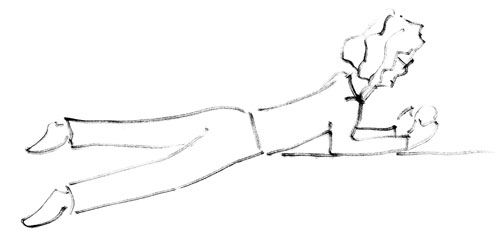
And so, we proceed with caution: already the usual separations described above have reaffirmed themselves in the authorship of the paragraphs that follow. The following text is not a manifesto, nor does it strive for completion; it is a first foray into presenting the nature of our work and maps out some of the frameworks we draw upon. The references we make are to theories that we like and that we came to the process carrying and wanting to explore. However, they are by no means the full measure of what we explored with nanopolitics: our everyday politics, organising and activism, friendships and relationships, collective processes, professionalised lives and workplaces, as well as life in London, a metropolitan city heavily invested in by financial capital.
With ‘nanopolitics’, we have tried to engage with the very difficult and sometimes impossible labour of connecting: bringing politics to the body and vice versa, in ways that do not deny or simplify experience. There is not much about a body that is ‘natural’. Therefore, when we say ‘body’ in this text, we do not mean a natural unit, but any singular configuration of parts (bones, tissues, prostheses), flows, affects, illnesses, tensions, chemicals and so forth; in other words, configurations that are never stable (even with ‘dead’ bodies) – and configurations that are mostly relational and not merely individual. We depart from different themes and methodological frameworks to address these questions. The methods we use include contact improvisation, theatre of the oppressed, soma (an anarchist therapy), voice work, somatic movement, street training. Themes of our sessions range from ways of inhabiting the city, work and organising in political groups to questions around love, voice, gender, sexuality, power and dominance, as well as tonalities of relation, aggression and fear. We ask how to get beyond our very bodies in the socio-economic and racially regimented spaces of the city, political activism and work.
Across and beyond the core collective, the nanopolitics group is composed of people based in London, UK, concerned with politics and with political organising and activist practices. Working in and around fields such as education, culture, therapy and care, members of the group bring a variety of experiences to thinking the body and politics. Some urgencies were shared across the first series of workshops, from which the collective began to emerge. A concern with thinking feminist and queer politics through bodily interactions and movement; a concern with alienated cultures of relationality in the workplace; with ways of using the body (that is, the voice, one’s gaze, touch and sound) to produce dominance and hide vulnerability; the repression of expressions of unease or sickness in contexts of radical political as well as professional projects. In the past year and a half, we have organised a series of eighteen sessions, through which some 120 people passed in more casual ways.
We organise open and free workshops based on different methodologies and techniques from drama, dance, bodywork and therapy—facilitated by various practitioners, some of which are part of the core group. Sessions that involve moving, touching, and sensing as much as discussing, remembering, and imagining, drawing connections between experiences and political, social and organisational questions. Most of our sessions happen in university spaces that we have access to at this point (Queen Mary, University of London and Goldsmiths, University of London), but we also run sessions in social centres, student unions and the street.
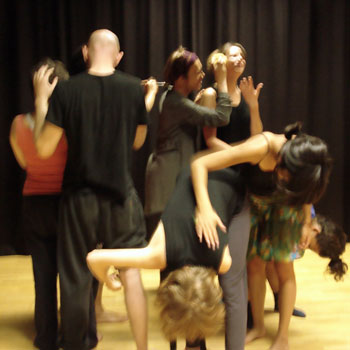 Inevitably we begin from our experiences, our concepts and our problematisations. After all, we stuck with this nanopolitics group because we felt existing political and analytical languages could not give account of what we considered fundamental to explaining why and how we do what we do. We began ‘nanopolitics’ as a provocation that allowed us to create a space for articulating these things on our own terms. As such, the word ‘nanopolitics’ took on meaning as we went along. As a concept and as a practice it slowly garnered resonance, allowing us to address our practices in ways that were not quite possible before. It is crucial to us that nanopolitics is a collective space of articulation, and of the politicisation of what is normally relegated to the realms of the non-political, the ‘not serious’ or the whimsical.
Inevitably we begin from our experiences, our concepts and our problematisations. After all, we stuck with this nanopolitics group because we felt existing political and analytical languages could not give account of what we considered fundamental to explaining why and how we do what we do. We began ‘nanopolitics’ as a provocation that allowed us to create a space for articulating these things on our own terms. As such, the word ‘nanopolitics’ took on meaning as we went along. As a concept and as a practice it slowly garnered resonance, allowing us to address our practices in ways that were not quite possible before. It is crucial to us that nanopolitics is a collective space of articulation, and of the politicisation of what is normally relegated to the realms of the non-political, the ‘not serious’ or the whimsical.
Versions of this text will be launched on different platforms (academic, militant, clinical) so as to complicate our process and enrich our writing, and we are currently working on a larger book project to produce a nanopolitics handbook.
1. towards a nanopolitics///a multiplicity of questions
Nanopolitics moves us. We give the name ‘nanopolitics’ to practices that are attentive to what we sense, feel and perceive. We are not merely referring to that which is considered ‘personal’ or ‘subjective’, i.e. limited to the individual, nor are we only concerned with the ‘objective’ understood as social processes that happen to us. Nanopolitics seeks to find collective ways to pay attention to how bodies are constantly produced and reproduced, moving according to lines of power, force, affect and desire. Nanopolitics allows us to move between different registers of sensing, of perception and of articulation. We get to meet bodies we do not know, perhaps even bodies we did not know could be possible. We learn that we change through the body; in our micro-realities, our outside worlds, our friendships, our work, our political organising and our being in space and time. Nanopolitics is the name we have given to a multi-faceted questioning of the body in relation to—and as an irreducible aspect of—the political: the political as relationality, bodies and movement.
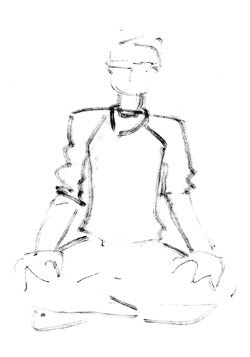 When we began this project, we found ourselves bringing a whole host of questions to the process: a list that has only grown and expanded with time. Curious, doubtful and ambivalent questions—our challenge was to address them in embodied encounters, shared experiments in movement, touch, vibration, and speech. These questions, these problems and concerns, are what move us. They are the dynamic and unstable ‘core’ of nanopolitics. As we have moved through our encounters, we have asked:
When we began this project, we found ourselves bringing a whole host of questions to the process: a list that has only grown and expanded with time. Curious, doubtful and ambivalent questions—our challenge was to address them in embodied encounters, shared experiments in movement, touch, vibration, and speech. These questions, these problems and concerns, are what move us. They are the dynamic and unstable ‘core’ of nanopolitics. As we have moved through our encounters, we have asked:
How is the body shaped by politics? In our every-day lives, we perceive different kinds of corporealities emerging from micro-political practices: hard and soft bodies, different tones of voice, different kinds of movement, different kinds of being together, in the circulation, production, embracing and fear of different kinds of affects. We also know how macro-political decisions affect our bodies, making us fat or skinny, broken or healthy, or investing or disinvesting in certain parts of our bodies.
How is the body interpellated, identified, subjected—made productive? In a society dominated by the demands of capital accumulation, the body is posited primarily as labour power: the body and soul put to work as human resource. The demands put on the body in this context place it in a double bind, a contradictory injunction1. On the one hand, the body is rendered passive-political in the imperative to become subjugated, its ‘normal’ structures formed as normalised effects of lost battles, subdued or temporarily inactive struggles. The body carries with it memories of what it wanted but failed to do, desires and possibilities that are of the body, But point beyond a past or a present. On the other hand, the body as affirmative of affects and traversed by enthusiasm. The body is active-political, it moves, pulls other bodies along, it is capable of affecting and being affected. Yet, this is equally a terrain of struggle as the body is rendered hyper-active. Neoliberal capitalism desperately needs ‘liberated’ bodies that are ‘creative’, flexible and productive—these are bodies that are individualised, ready to cope with the unforeseeable, with risk, stress, danger. How then, to reactivate, politicise and de-traumatise these struggles, and how to de-individualise the defeats and conformism our bodies have suffered? How to free the body from the repression of waged labour? How can we liberate our bodies otherwise, how can we make brave and flexible bodies that escape the flexibility required by the market, bodies that don’t fit the properness of their supposed normality? How to open up our vulnerabilities to each other, in a way that can counter both the threats to the stability of our individual selves and the pressure of having to be and perform as (working) supermen and wonder-women?
How are our bodies engaged and produced in current struggles? How, in our struggles, do we find ourselves being affected, changed, expanded and reprimanded? How can we talk about our political practices with our bodies in mind? How to grasp the ways in which race, class and gender play out through bodily experiences without reducing the body to a socially constructed object that is unto itself? Our politics against deeply embodied racisms, sexisms and elitisms will only ever be superficial and unconvincing if it does not alter the ways our bodies relate and move together.
How can we think a politics that starts from the movements of bodies? Or rather: how do we live politics all the time, how do our bodies resist and propose different paths often without our conscious knowing? This includes a politico-corporeal investigation into the social and the economic from the point of view of what our bodies refuse or demand to do—from our fatigue, stress, depressions to our addictions, compulsions and guilty resistances; from our procrastination and snoozing to the affirmations of our pleasures, desires, and energies. Too often we have found that our political activism mirrors the hyper-productive mode of our work, with its over-work, stress and guilt. How to politically investigate and reshape work and politics from the point of view of what our bodies can do, from a consideration of our exhaustions, burn outs and blockages, our household of affects, passions and desires?
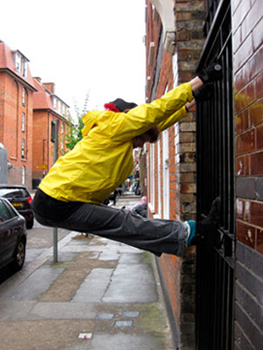 How can an undoing and reshaping of our bodies have an impact on an undoing and reshaping of our subjectivities and of our institutions? A practice of undoing our bodies does involve some sort of violence: the undoing of a body is the undoing of its traumas as well as the undoing of what our body has become comfortable with: The defensive reactions learned and absorbed to cope with those traumas, behaviours perceived as normal and natural that makes life ‘easier’ for our bodies. This undoing is therapeutic: not in a sense that necessarily makes us feel better, but in a sense that ‘cures’ our bodies both from traumas and repressions, and from a (neoliberal) poison that gets absorbed as a ‘normality’, a sense of freedom to take new paths. How can we undo the traumatic contractions, defensive patterns, imposed schemes of normality? How can this have an impact on the undoing of our subjectivities and our institutions, on the creation of different institutions from the crumbling of existing ones?
How can an undoing and reshaping of our bodies have an impact on an undoing and reshaping of our subjectivities and of our institutions? A practice of undoing our bodies does involve some sort of violence: the undoing of a body is the undoing of its traumas as well as the undoing of what our body has become comfortable with: The defensive reactions learned and absorbed to cope with those traumas, behaviours perceived as normal and natural that makes life ‘easier’ for our bodies. This undoing is therapeutic: not in a sense that necessarily makes us feel better, but in a sense that ‘cures’ our bodies both from traumas and repressions, and from a (neoliberal) poison that gets absorbed as a ‘normality’, a sense of freedom to take new paths. How can we undo the traumatic contractions, defensive patterns, imposed schemes of normality? How can this have an impact on the undoing of our subjectivities and our institutions, on the creation of different institutions from the crumbling of existing ones?
How to collectively sharpen our ways of sensing, our pre-cognitive, affective and desiring capacities, via practices of listening as well as of expressing? The body serves in these experiments as a kind of seismograph, as well as a surface of inscription and decoding. To undo some habits and to cultivate others, to build collective cultures of being around each other, new modes of intimacy and of distance; to navigate between personal narratives, experiences and contexts, as well as broader social, political and historical ones: These are not matters than are easily solved, nor can they ever be resolved in the sense of being solved once and for all time: they are processes.
How can we learn to support, sustain and take care of each other? How can we bring that lightness and intensity generated through the physical exercises and games of our nanopolitics sessions into our everyday life, into a taking care of each other that becomes light? How can we generate a becoming common of our lives, starting from its more basic aspects like eating, sleeping, drinking and breathing? Can we learn from nanopolitics how to practice a life together, a different life from the one we know, which is often so centred onto our individual selves? How can we move from exercising a proximity of our bodies to exercising a proximity of ourselves, a getting close and implicated with each other which would differ from both the black holes of personal and exclusive commitments and the shallow utilitarianism of a networking modality? How to develop practices of self-care (not just individual but collective) that evade the neoliberal capture of self-help and self-management as well as new ageist solipsism? How to take seriously the ecologies of the social, environmental and psychic by investigating a fourth dimension, that of sensation, movement and experience?
2. some nanopolitical coordinates, cadences and caveats
When we write ‘nanopolitics’ here, we do not refer to something unitary, but to a complex multidimensional proposition, both ‘ontological’ and ‘epistemological’; we speak of it both as a real mode of politics, a practice, and as a register of perception. It is a mode of sensitivity, or better an analytics of the reference system for normality that concerns not only texts and modes of speech, but gesture, facial expressions, habits, practices and forms of life—what Foucault2 understands as ‘discourse’. Inscribed in nanopolitics is also a notion of ‘scale’, a set of practices and concepts that attune us to a dimension of the political, which is often forgotten in, but intrinsically connected to what is usually called ‘political’.
Nanopolitics is both about politics on the body and politics from the body, as well as the intersections between the two in the repressions, resistances and resonances in and all around us. Nanopolitics is less a matter of scale understood as a level or unit of analysis, and more about an attention to the ‘scale’ of embodied intensities which can concern groups as much as bodies of individuals. As such, nanopolitics inevitably implicates the micro and the macro-political, although there is nothing straight-forward in this implication. When we speak of micropolitics, we are drawing on the work of Felix Guattar 3 and others, which means a register of politics that is attentive to the relational and social, to compositions within and across groups. This ‘micro’ is not merely one of scale, but a matter of a sensitivity to social bodies and group processes, as informed by the trajectory of Institutional Analysis that emerged from experimental clinics such as St.Alban and La Borde in France in the 1950s. This ‘micro’ positions itself with regard to the knowledges and sensitivities that constitute the ‘macro’, the latter being the realm of more abstract, national or global political processes. ‘Macro’ and ‘micro’ are inseparable, according to Guattari; we add to this the idea of a ‘nano’ dimension which concerns knowledges of and sensitivities to the body, affects and relational dynamics.
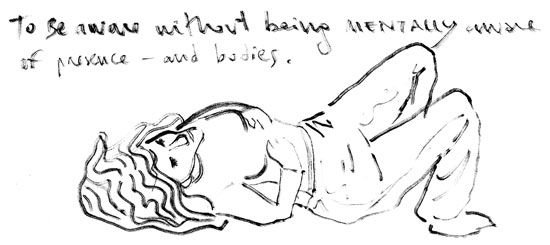 Nanopolitics develops different understandings of the affective, relational workings of forces and power. With ‘nano’ we talk about how what occurs at the level of the group, the world, the institution or the social comes to exist under our skin, in our guts, through our voice, in our touch and in the ways we feel. Our complex and practically-oriented notion of ‘nano’ began from an intuitive use of the prefix ‘nano’ to designate our political practice as different yet complimentary to the ‘micro’ and the ‘macro’. Since then, we have also strayed into the realms of technoscience and popular culture in the search for orientations that can help shape how we make sense of what it is that we are engaged in. In common parlance the prefix ‘nano’ is used to indicate something very very small, beyond what the eye can perceive. It is derived from the Ancient Greek ‘nannus’ meaning ‘dwarf’ or ‘small man’. In scientific discourse ‘nano’ denotes a particular measure, namely a unit the size of one billionth of a metre4. As a form of measure, which operates on the scale where materiality itself is constituted, it encounters matter not as separate and solid, but at the level of the formation or dissolution of solidity.
Nanopolitics develops different understandings of the affective, relational workings of forces and power. With ‘nano’ we talk about how what occurs at the level of the group, the world, the institution or the social comes to exist under our skin, in our guts, through our voice, in our touch and in the ways we feel. Our complex and practically-oriented notion of ‘nano’ began from an intuitive use of the prefix ‘nano’ to designate our political practice as different yet complimentary to the ‘micro’ and the ‘macro’. Since then, we have also strayed into the realms of technoscience and popular culture in the search for orientations that can help shape how we make sense of what it is that we are engaged in. In common parlance the prefix ‘nano’ is used to indicate something very very small, beyond what the eye can perceive. It is derived from the Ancient Greek ‘nannus’ meaning ‘dwarf’ or ‘small man’. In scientific discourse ‘nano’ denotes a particular measure, namely a unit the size of one billionth of a metre4. As a form of measure, which operates on the scale where materiality itself is constituted, it encounters matter not as separate and solid, but at the level of the formation or dissolution of solidity.
Nanoscience is a science of the isolation and objectification of the ‘nano’, its external measure and manipulation. Nanoscience is a gaze that presents what we are made up by, what passes through us, what forms our environment as field of technical intervention. Nanoscience is also a frontier of the capitalist economy, a new area of financial investment and of commodification. The way that we deploy ‘nano’ in our designation of ‘nanopolitics’ pertains to an experiential and experimental affirmation that ‘nano’ is felt rather than seen. It is not simply an external measure, but a field we inhabit and sometimes also feel displaced in. It is where our bodies can take measure of themselves, immanently measuring and thus transforming what they can do. Still, nanoscience holds interesting orientations for our nanopolitics if we, (not just) speculatively, posit the identity between the manipulators and the manipulated. Nanoscience suggests that the properties of an object change with scale due to changes in the surface area to volume ratio5. We take this as an opening towards thinking, not just talking about a more nuanced way of understanding the world we inhabit, but about different ways of doing so. Consequently, the ‘scale’ at which we analyse something changes the properties of the object of analysis, even if the ‘nano’, ‘micro’ and ‘macro’ are somehow ‘organically’ if not seamlessly connected. In these terms, the notion of the body changes the meaning between ‘nano’, ‘micro,’ and ‘macro’: We might say that if macropolitics and micropolitics work on ‘the body’—the determinate singular of the living corpse of the mass individual—nanopolitics as active politics flows from bodies in the plural in so far as they always find ways to come together.
Something the size of ‘nano’ is seen by sensing/feeling; it involves using a kind of microscope called ‘cantilever’, which has a tip the diameter of an atom. This tip ‘feels’ the proximity of the atoms of that surface as an attraction or repulsion and bends in response6. ’Nano’ is not ‘microscopic’ because it is smaller than micro, but because there is nothing scopic about it: it must be felt; sometimes with the eyes. In this sense ‘nano’, even for science, is not simply a smaller scale. The leap from the ‘micro’ to the ‘nano’ is not just quantitative, but marks a shift of qualities themselves: from the ‘micro’ to the ‘nano’, the systems of reference and the means of manipulation and measure themselves, as well as the properties of materiality itself. The discourses and practices dealing with the nano-scale are not about some fundamental and more ‘real’ scale (as in the classical theories of atoms as primary matter), they do not reduce everything actual to the nano-level, or propose that all potentiality is to be found there. Rather, they experiment with and confirm that different potentialities and actualities can be discovered in a journey in ‘nano’.
When we speak of ‘nano’ as different from the ‘micro’ or ‘macro’, we point to a scale of becoming that has properties of its own, without being isolatable from other scales. ‘Nano’ is not like the inner babuska of a Russian doll—at the heart of the complex and problematic social bodies we inhabit—we are not dealing with isomorphic dolls that can be unpacked and compared by an observer: their relation is not one of a neat fitting together, but of a complex interplay between heterogeneous levels, between different scales with each their range of structurations, solidities, dynamisms.
3. tentative summations///nano and the political field
As a political field, ‘nano’ has many (hi)stories. The least we can say is that less and less it is taken as something that simply is (as a base corporeality or a natural sociality) and that more and more it is put under external measure and control. As Patricia Clough7 has pointed out in relation to affect, “ideological interpellation and subject disciplining no longer are the centre-piece of an understanding of sociality.” Even though both of these forms of control still occur, we must be attentive to the affective backgrounds that stimulate ways of life. The development of global capitalism—the totalisation of the macropolitical—works through the intensification of the putting to work of the nanopolitical, “when the machine becomes planetary or cosmic, there is an increasing tendency for assemblages to miniaturise, to become micro- [and we must add nano-] assemblages.”8
This text poses many questions. For us, this questioning is part of a nanopolitical practice. However, nanopolitics is not just a set of questions, it is a situated space of questioning, a site in which the nanopolitical is worked and reflected on, and from which new questions arise. It is a questioning that is at once circular and expansive, intensive and extensive. There are many ways in which we interact with others, and lots of things that we can do with others that do not come from reason, argument or speaking – even as they intertwine and subvert one another. Often, there is a hierarchy between reason and the physical. Even where there is not, often a dichotomy remains. To ‘start from the body’ is to give attention differently, to become and move together in other modes, rhythms, to begin to break down the rule of reason of the body as well as the separation between the two on which this rule rests. However, it is easy to fall back into the familiarity of intellectualising as a mode that we are comfortable with, for which the body becomes an object or an abstract concept.
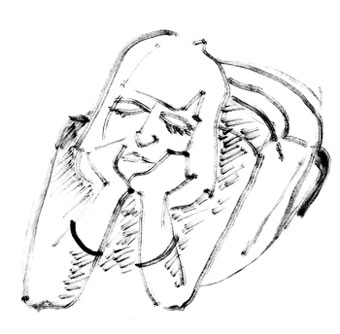 We see nanopolitics is a collective process of becoming, and of care. Beyond and aside from the interactions between individuals within a group, nanopolitics designates an ensemble of different bodies and the multiple processes which produce, extend or expand the nanopolitical. To bring a political reading and practice to our lived, felt or suffered experiences is not easy in a culture where the body is either repressed, essentialised, medicalised or fetishised: distinguishing between various pitfalls in speaking about one’s embodied experience is a key aspect to our nanopolitical practice, not just within our group but vis a vis an outside. Having an enhanced awareness of and sensitivity towards the body is helpful, but we can still close in on ourselves and become self-referential, self-obsessed, trapped in ourselves. The question could be how to, in any sort of everyday situation—at work, at home, in the street—produce a shift from the self as the ontological point of reference (i.e. one’s ability to sense and to perceive) towards an attention to relationality and collectivity. The body, then, not as the container of an individual self but as translator, transductor, and transformer of self and other. How can we make this bodily attentiveness, the unleashing of different energies, the undoing of enforced patterns and compulsions happen collectively in situations which are not predisposed for this?
We see nanopolitics is a collective process of becoming, and of care. Beyond and aside from the interactions between individuals within a group, nanopolitics designates an ensemble of different bodies and the multiple processes which produce, extend or expand the nanopolitical. To bring a political reading and practice to our lived, felt or suffered experiences is not easy in a culture where the body is either repressed, essentialised, medicalised or fetishised: distinguishing between various pitfalls in speaking about one’s embodied experience is a key aspect to our nanopolitical practice, not just within our group but vis a vis an outside. Having an enhanced awareness of and sensitivity towards the body is helpful, but we can still close in on ourselves and become self-referential, self-obsessed, trapped in ourselves. The question could be how to, in any sort of everyday situation—at work, at home, in the street—produce a shift from the self as the ontological point of reference (i.e. one’s ability to sense and to perceive) towards an attention to relationality and collectivity. The body, then, not as the container of an individual self but as translator, transductor, and transformer of self and other. How can we make this bodily attentiveness, the unleashing of different energies, the undoing of enforced patterns and compulsions happen collectively in situations which are not predisposed for this?
[This article was originally published at http://www.culturalstudiesassociation.org/lateral/issue1/nanopolitics.html. A PDF of the original version has been archived at https://archive.org/details/Lateral1.]
Notes
- Franco Berardi, The Soul At Work—From Alienation to Autonomy (New York: Semiotexte. 2009): 65. ↩
- Michel Foucault, “Le discours ne doit pas etre pris comme… ,” in: Dits et Ecrits, Vol. 2 (Paris: Gallimard, 1976/2003). ↩
- Felix Guattari, ”Microphysics of Power/Micropolitics of Desire,” in: The Guattari Reader, ed. Gary Genosko. (Massachusetts: Blackwell, 1996), 172. ↩
- cf. Katherine Hayles, nanoculture (Intellect Books,2004), 11. ↩
- cf. John Mongillo, Nanotechnology 101, (Westport, CT: Greenwood Press, 2007). ↩
- Felice C. Frankel, and George M. Whitesides, No Small Matter—Science on the Nanoscale, (Cambridge, MA: Harvard University Press, 2009), 4. ↩
- Patricia Clough, “The New Empiricism, Affect and Sociological Method,” European Journal of Social Theory 12, no.1 (2009): 50. ↩
- Gilles Deleuze and Felix Guattari, A Thousand Plateaus (London: The Athlone Press, 1998), 213. ↩